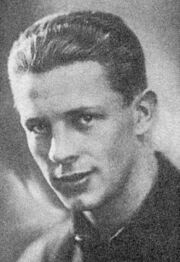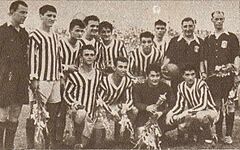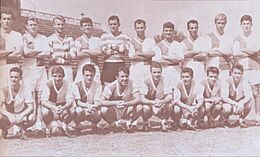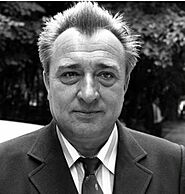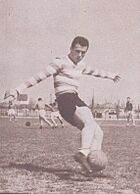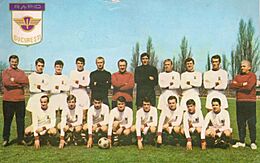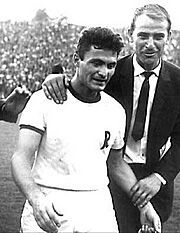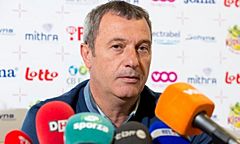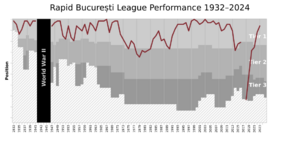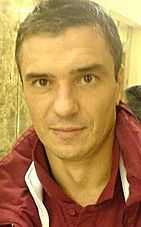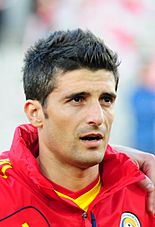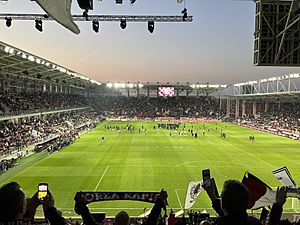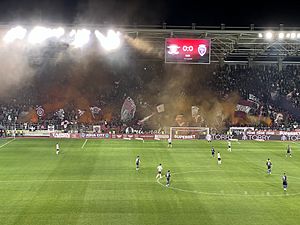FC Rapid București facts for kids
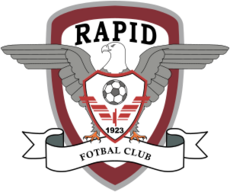 |
|
| Full name | Fotbal Club Rapid SA |
|---|---|
| Nickname(s) |
|
| Short name | Rapid |
| Founded | 25 June 1923 as CFR București 2016 (refounded) as Mişcarea Feroviară CFR București |
| Ground | Superbet Arena-Giulești |
| Capacity | 14,048 |
| Owners | Dan Șucu (80%) Victor Angelescu (20%) |
| Chairman | Victor Angelescu |
| Head coach | Constantin Gâlcă |
| League | Liga I |
| 2024–25 | Liga I, 5th of 16 |
Fotbal Club Rapid, often called Rapid București or just Rapid, is a professional football club from Bucharest, Romania. They play in Liga I, which is the top football league in Romania. The club started in 1923. It was founded by workers from the Grivița railway workshops. Back then, it was known as Asociația Culturală și Sportivă CFR.
Rapid București is one of Romania's most successful football teams. They have won three national league titles. They also won the Cupa României (Romanian Cup) 13 times. Plus, they have four Supercupa României trophies. In international games, their best results were reaching the quarter-finals of the 1972–73 European Cup Winners' Cup and the 2005–06 UEFA Cup. They also made it to the final of the 1940 Mitropa Cup, but that game was never played because of World War II. The club faced financial problems and was declared bankrupt in 2016. However, it was refounded and returned to the top league in 2021.
Since 1939, Rapid has played its home games in burgundy and white uniforms. Their traditional stadium was the Valentin Stănescu Stadium. A new stadium, Rapid-Giulești, replaced it in 2022. The team has strong local rivalries. Their biggest rivals are FCSB, Dinamo București, and Steaua București. They also have a rivalry with Petrolul Ploiești.
Contents
Club History
Early Years: 1923–1932
On June 25, 1923, railway workers in the Grivița neighborhood of Bucharest created a sports club. They called it Asociația Culturală și Sportivă CFR. Teofil Copaci was the first president. Grigore Grigoriu became the team's first captain. The team was formed in September by combining two smaller teams. Their first uniforms were made from burgundy fabric at Grigoriu's house.
The team played its first game on October 28, 1923. They lost 4–8 to Unirea Timișoara. Ten days later, they lost 1–2 to Gloria Arad. Until 1932, CFR played in the Bucharest Championship. They did not reach the national league's final tournament during this time.
Golden Era: 1932–1945
The club joined Divizia A, Romania's top league, in the 1932–33 season. Before World War II, Rapid was one of Romania's best teams. They often won the Romanian Cup. However, they never won the league championship, though they came very close. One time, Rapid lost the title because a player was very honest. In a key match against Venus București, a Rapid player touched the ball with his hand in the penalty area. Rapid needed to win this game to finish first. The referee didn't see it at first. But when the crowd protested, he asked the player. The player admitted he had touched the ball.
| Period | Name |
| 1923–1937 | CFR București |
| 1937–1945 | Rapid București |
| 1945–1950 | CFR București |
| 1950–1958 | Locomotiva București |
| 1958–2016 | Rapid București |
| 2016–2017 | Mişcarea Feroviară CFR București |
| 2017–2018 | Academia Rapid București |
| 2018–2019 | Fotbal Club R București |
| 2019–present | Fotbal Club Rapid 1923 |
Venus scored from the penalty kick, making the game a 1–1 draw. This meant Venus finished first instead of Rapid. During this period, Rapid finished second in the league several times.
Rapid won seven Romanian Cups in this period. Six of these wins were in a row. This was the club's most successful time in the cup competition. In the summer of 1937, the club changed its name. It went from CFR București to Rapid București. This new name was inspired by the Austrian club Rapid Wien.
The "railway workers" were still very popular with fans. Some players were even chosen for the national team. Rapid won the Bessarabia Cup in 1942. They also reached the final of the Mitropa Cup. This was an important European competition before the UEFA Champions League. In 1940, Rapid tied in the Mitropa Cup semi-finals. They were supposed to play in the final, but it was canceled because of World War II.
Solid Team: 1945–1970
After World War II, Rapid returned to the Bucharest Championship in the 1945–46 season. They finished 4th. The club then went back to its old name, CFR. They joined the 1946–47 Divizia A season, the first official national season after the war. They finished 5th. In the 1948–49 season, "the White and Burgundies" finished 2nd. On March 20, 1949, CFR București had its biggest win ever, 12–2 against CFR Cluj.
In the 1950s, the club's name changed again. Due to the communist government, Rapid became Locomotiva in 1950. This name was similar to Soviet teams like Lokomotiv. This change was required for all teams linked to the Romanian Railways. The team finished 2nd that year. Rapid was relegated to Liga II for the first time in 1951. They returned to Divizia A one year later. In 1954, Locomotiva was relegated again. But they came back to Divizia A after just one year.
In the 1957–58 season, Romanian football went back to the autumn-spring schedule. In 1958, the team changed its name back to Rapid. The 1960s were a great time for Rapid football. In 1961, Rapid reached the Romanian Cup final. They lost 1–2 to Arieșul Turda, a team from a lower league. The next season, Rapid reached the final again. They lost 1–5 to Steaua București.
For most of the 1960s, Rapid was in the top half of the league. They finished 2nd three years in a row: 1963–64, 1964–65, and 1965–66. This motivated "the Railwaymen" even more. At the end of the 1966–67 season, they achieved their best result yet. They won their first Divizia A title. Valentin Stănescu and Victor Stănculescu were their coaches. Rapid won the title by two points over Dinamo București. Ion Ionescu was the top scorer with 15 goals.
In the 1967–68 European Cup, Rapid beat the Bulgarian champion, Botev Plovdiv. But they lost to Juventus, 0–1. In the 1967–68 season, the team reached the Romanian Cup final. They lost 1–3 to Dinamo in extra time. They finished 3rd in 1968–69 and 2nd in 1969–70.
Challenging Times: 1970–1990
Rapid's last strong season was in 1970–71, when they finished 2nd. After that, their performance declined. In 1972, Rapid reached the Romanian Cup final. They won 2–0 against Jiul Petroșani. In the 1971–72 UEFA Cup season, Rapid had good results. They beat Napoli and Legia Warsaw. But they were stopped by Tottenham Hotspur, losing 0–5. The 1972–73 European Cup Winners' Cup was another good European journey. After beating Landskrona BoIS and Rapid Wien, they were eliminated by Leeds United, 1–8.
At the end of the 1973–74 season, Rapid finished 16th. They were relegated for the third time in their history. This was only seven years after winning their first national title. The team had a strong next season and was promoted after just one year in the second league. They finished 1st in their series. "The Railwaymen" also won the Romanian Cup in the same season. This was surprising because they were a second-division team. In the 1974–75 Cupa României campaign, Rapid beat strong teams like Dinamo București and Steaua București. In the final, they played against Universitatea Craiova. Rapid won 2–1 in extra time.
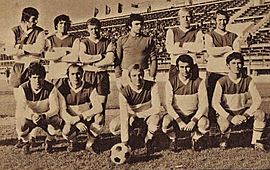
Back in Divizia A, Rapid had two average seasons. They were relegated again in 1976–77. This was 10 years after becoming champions of Romania. This relegation started a difficult period for the club. They spent six seasons in Divizia B. This period also led to strong rivalries with Petrolul Ploiești and Progresul București. A 1980 match against Progresul had over 50,000 fans. This was a record for a Divizia B match. Rapid returned to the first division thanks to coaches Valentin Stănescu and Viorel Kraus.
Rapid then had a disappointing time in Divizia A. In these five seasons, "the Railwaymen" had their biggest loss ever, 0–9 against Corvinul Hunedoara. They also had their biggest home loss, 2–8 against Steaua București. After these poor results, the team was relegated to Divizia B for the fifth time. The Giuleștenii then had a good season in the second league. They finished 1st and were promoted again.
A Glorious Period: 1990–2008
After being promoted back to the top league, Rapid finished 11th the next season. They then showed progress, finishing 7th and then 4th. In 1993, George Copos bought the club. This started one of the most successful times for "the White and Burgundies."
After finishing 4th in 1993, Rapid returned to European Cups after 18 years. They were eliminated in the first round by Inter Milan. In 1994, the club finished 4th again in Divizia A. The 1994–95 UEFA Cup season brought tough opponents. Rapid beat Charleroi but was eliminated by Eintracht Frankfurt. In Divizia A, they finished 4th again, but did not qualify for European competitions.
In the 1995–96 season, the team finished 3rd. This qualified them for the UEFA Cup again. They beat Lokomotiv Sofia but were eliminated by Karlsruher SC. The squad finished 8th at the end of the 1996–97 season.
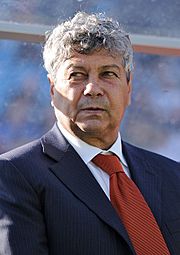
With Mircea Lucescu as the new coach, Rapid had a very good 1997–98 season. They finished 2nd in the championship, just two points behind Steaua București. They missed winning the title, their first since 1967. In the last match, Rapid had a goal disallowed, which caused much debate. Without the league title, Rapid focused on the Romanian Cup. They won their 10th cup title, their first since 1975. In the final, they beat Craiova.
The 1998–99 season started poorly in Europe. Rapid was eliminated early from the 1998–99 UEFA Cup Winners' Cup. However, in the championship, Rapid had one of its best seasons ever. They finished 1st with 89 points. They won the league title, their second in club history. This was achieved under several coaches, including Mircea Lucescu.
The 1999–2000 season was also good for Rapid. They finished 2nd in the league. But they couldn't catch Dinamo București, who finished 1st. Rapid was also eliminated from the Romanian championship semi-finals. The UEFA Champions League was a big disappointment. The team was eliminated by the Latvian side Skonto.
The 2000–01 season saw new coaches. Rapid finished 4th in the league. They were eliminated in the Romanian Cup quarter-finals. The next season, with Viorel Hizo as coach, Rapid finished 3rd in the league. They had a good run in the 2001–02 UEFA Cup. They won their 11th Romanian Cup. They beat Dinamo București 2–1 in the final.
The 2002–03 season saw the club win its third league title. They finished 1st, seven points ahead of Steaua București. The team was coached by Mircea Rednic.
The 2003–04 season was below expectations. Rapid finished 3rd. In the UEFA Champions League, Rapid was eliminated early. The 2004–05 season started with a new coach, Răzvan Lucescu. "The White and Burgundies" finished 3rd again. They were eliminated early from the Romanian Cup.
The 3rd place finish qualified the club for the 2005–06 UEFA Cup season. Rapid had its best European season ever. They reached the quarter-finals for the first time. They beat teams like Sant Julià, Vardar, and Feyenoord. In the group stage, they won three games and lost one. They continued to beat German teams like Hertha and Hamburg. "The Burgundy Eagles" were stopped in the quarter-finals by another Romanian team, FCSB. This was a very memorable season for both clubs. Rapid also lost the Romanian league title to FCSB. But they won the Romanian Cup. They beat Dinamo București 1–0.
In the next two seasons, Rapid finished 4th (2006–07) and 3rd (2007–08). They won another Romanian Cup title in 2007. In the UEFA Cup, they reached the group stage again in 2006–07. But they did not qualify for the semi-finals. The next season, they were eliminated in the first round.
Challenges and Rebirth: 2008–Present
After the 2007–08 season, Rapid faced financial difficulties. The team's performance also declined. They finished in mid-table positions for several years. Still, the team had some success in the 2010–11 and 2011–12 seasons. Under coaches like Marius Șumudică and Răzvan Lucescu, they finished 4th twice. They also played in the UEFA Europa League. They reached the group stage in 2011–12 UEFA Europa League. The next season, Rapid was eliminated in the third qualifying round.
On May 10, 2013, the Romanian Football Federation did not give the club a license for the 2013–14 season. This meant they couldn't play in the top league. The club was then sold to new owners. On August 2, 2013, a court decided that Rapid should be relegated. This was after 23 years in the top league.
Relegated for the sixth time, Rapid tried to recover. Despite financial problems, they had a good season under coach Viorel Moldovan. They finished 2nd in 2013–14 and were promoted back to the first league. However, on May 17, 2014, they were again denied a license for the 2014–15 season. Rapid appealed, and their fans even donated money for the appeal fee. The appeal was successful, and Rapid got its license.
The club was then bought by Valerii Moraru. But the team had a very weak season. They finished 16th and were relegated back to Liga II for the seventh time. Back in Liga II, with Dan Alexa as coach, Rapid had a solid season. They were promoted in 2015–16, finishing 1st. However, the club's financial problems continued. They could not sign new players or coaches. On December 14, 2016, Rapid was officially declared bankrupt.
In summer 2016, it became clear the original team could no longer play. The idea of starting a new club in lower leagues appeared. This led to two new clubs: AFC Rapid București and Mişcarea Feroviară CFR. Both teams played well and were promoted to Liga IV.
In summer 2017, the Sector 1 Municipality helped create Academia Rapid București. This club joined the Liga IV – Bucharest series. Former Rapid players like Daniel Niculae (president) and Daniel Pancu (technical director) ran the club. Academia Rapid became very popular with supporters. They saw it as the true successor to the original club. Mișcarea Feroviară disappeared that summer.
Academia Rapid had a great season. They won 2017–18 Liga IV Bucharest. They also won the Bucharest Romanian Cup preliminary rounds. The club then qualified for Liga III after winning a play-off match. On June 12, 2018, Academia Rapid bought the FC Rapid București brand. This officially made them the successor to the original club. The purchase cost €406,800. This confirmed their legitimacy. Many fans and club legends already accepted them as the true club. A match against Steaua București on April 14 saw 37,000 fans attend.
The 2018–19 season had some challenges for Rapid. Coach Constantin Schumacher was replaced by former-player Daniel Pancu. This also led to some player departures. On November 24, Rapid played its last game in Giulesti. The stadium was later demolished to build a new one. They played future matches at Regie. On May 12, Rapid secured promotion to Liga II. They finished 1st with 75 points.
The new 2019–20 season saw Rapid in the Romanian second Division. Daniel Pancu was the head coach. Victories against top teams gave them hope for promotion. Rapid was in 3rd place at the season's halfway point. After a poor start to the second half, Daniel Pancu was replaced. Dan Alexa became the new head coach. He was also replaced after a few months. Adrian Iencsi was then hired, but he also did not perform well. The assistant coach, Mihai Iosif, became the new head coach. Iosif succeeded in bringing Rapid to the first Romanian League (Liga I). Rapid started the 2021–22 season in Liga I very well. They had five wins in a row and no goals conceded in seven matches. This was a record in Romania.
Club Identity
Colors
The club's official colors are white and burgundy. These colors come from the capital of Romania, Bucharest. You can see them on the club's badge and uniforms throughout its history. The club's founders chose these colors. The first uniforms were made from burgundy cloth at Grigore Grigoriu's house.
Crest
The Rapid Bucharest crest usually featured a symbol related to the CFR (Romanian Railways). After communism began in Romania, Rapid was forced to use the name CFR Bucharest again. In 1950, it became Locomotiva Bucharest. Its symbol was a red steam locomotive. From 1958, the club returned to the name Rapid Bucharest. They adopted a logo that changed little until George Copos bought the club. He changed the badge when he arrived. In 2001, Rapid's current crest was chosen. It was inspired by Benfica Lisbon, a famous club in Portugal. Benfica's emblem features a legendary eagle.
Anthem
The Rapid anthem is also known as "We are everywhere at home." Victor Socaciu composed the music, and Adrian Păunescu wrote the lyrics. This anthem was created in June 1980. At the club's 100-year anniversary, the football club and sports club released a music album. The club president, Daniel Niculae, also sang on it.
Home Grounds
Stadium
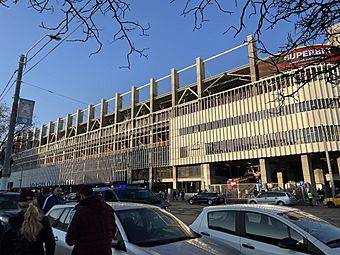 |
|
| Location | 18 Giulești Way, Giulești, Bucharest Bucharest, Romania |
|---|---|
| Owner | CS Rapid București |
| Capacity | 14,047 |
| Surface | Grass |
| Construction | |
| Broke ground | 26 February 2019 |
| Opened | 26 March 2022 |
| Architect | Construcții Erbașu |
The history of Giulești-Valentin Stănescu Stadium began in 1934. On March 31, CFR started building a football field on Giulești Road. The field would be 65 meters wide and 105 meters long.
The mayor of Bucharest first did not want to allow the stadium's construction. This was because it did not fit the city's plans. But permission was eventually given. Construction began in 1936 and took over two years. The main architect was Gheorghe Dumitrescu.
The stadium opened on June 10, 1939. At that time, it was Romania's most modern stadium. It was a smaller copy of Arsenal's Highbury Stadium. It could hold 12,160 people. King Carol II and his son, King Michael, attended the opening.
The north stands were finished in the mid-1990s. This increased the capacity to 19,100 seats. In 2003, the pitch was changed. It was considered the best in Romania then. Floodlights were added in summer 2000. The stadium was named "Valentin Stănescu" in 2001. This honored the manager who won Rapid's first championship. But it is still often called "Giulești Stadium". This is because of the neighborhood it is in.
The stadium closed on November 24, 2018. It was demolished from January to May 2019. This made way for the new 14,000-seat Rapid Arena. The Romanian government and UEFA funded the new stadium. Bucharest was a host city for UEFA Euro 2020.
After Giulești Stadium closed, Rapid temporarily moved to Regie Stadium. This was the former home of Sportul Studențesc. Regie Stadium had been closed since 2014. Rapid invested in its reconstruction before moving there in January 2019.
After being promoted to Liga I in summer 2021, the team played home games at the Arena Națională. The new Stadium Rapid-Giulești, also known as Superbet Arena, opened on March 26, 2022. It cost €67 million and can hold 14,050 spectators.
Training Facilities
The ProRapid sports center is in the north-western part of Bucharest. The former owner, George Copos, bought it in 1998. This was at the request of Mircea Lucescu, the coach who won the second championship. The complex first had four football fields and modern training facilities. But over the years, it became run down. Still, in the late 1990s, "Pro Rapid" was considered the most modern training base in Romania.
The facility covers five hectares. It includes several playgrounds, three tennis courts, and an indoor swimming pool. There is a building where players used to train. The facility is surrounded by Lake Străulesti. Another building has living areas for players. It also has medical rooms, changing rooms, and a gym. Accommodation for youth team players is in a building with a bar and restaurant. In June 2016, the company SC FC Rapid SA went bankrupt. The ProRapid base then started to get worse. Currently, the football team trains at the Coresi training base.
Fan Support
Rapid București is a very popular club. A 2013 survey showed it was the third-most supported club in Romania. It was the second most supported in Bucharest. About 20% of football fans in the city support Rapid. A special group called the "Aristocratic Club of Rapid" was founded in 2000. Its members are famous artists. They work to protect Rapid's history and traditions.
At first, Rapid was the railway club. Its supporters were mostly people connected to railway workers. New fans started joining in the early 1930s. This was when Rapid's legendary team won many hearts. Their exciting play and repeated wins of the Romanian Cup between 1935 and 1942 attracted many.
In 1967, actor Mihai Ioan taught supporters how to sing chants. He became the first leader of the fan section. Today, Rapid's main fan groups are Peluza Nord and Tribuna II (t2 Rapid). Rapid fans were the first in Romania to start "ultras" groups in the 1980s. These groups are known for their passionate support.
The supporters of Politehnica Timișoara and Rapid have been friends for 30 years. This friendship started at the Romanian Cup final in 1980-81. Fans from both teams supported each other. After the Revolution, Rapid fans visited Timisoara. They honored those who died in December 1989.
Club Rivalries
Bucharest Derby
Rapid's most important rivalries are against FC Steaua București. These two clubs have played over 130 times. Their first game was Rapid's 1–0 victory on November 4, 1947. Many matches between Steaua and Rapid have led to serious clashes between fans. Both teams are known for being dominant in Romanian football, along with Dinamo. The rivalry became even stronger after Steaua beat Rapid in a Romanian quarter-final of the 2005–06 UEFA Cup. This rivalry also extends to other sports.
Primvs Derby
Another strong rival for Rapid is Petrolul Ploiești. This team used to be based in Bucharest. Their rivalry is called the Primus Derby. It is the oldest football derby in Romania. This is a fierce rivalry where fans create amazing displays and cheer loudly for their teams. The first big match between Petrolul and Rapid was in the 1965-66 season. They both fought for the Romanian championship title. Petrolul won that year. A year later, Rapid got its revenge. They won their first title after a draw in Ploiesti.
In the 1973-1974 season, both teams were relegated to Division B together. From 1978 to 1982, both teams were in Division B. A key match between them happened in spring 1982. It was at Stadionul Steaua, with 35,000 fans. Rapid won clearly, 5–1. Another important match was the Romanian Cup final in 1995. Petrolul won its second cup after beating Rapid in a penalty shootout. The rivalry also extends to other sports.
Rapid also had other rivals in Bucharest. These included Dinamo Bucuresti, Progresul București, and Venus București. They also had derbies against other railway teams like CFR Cluj and CFR Timișoara. Other less important rivalries are with Universitatea Cluj, Farul Constanța, Universitatea Craiova, and UTA Arad.
Ownership and Finances
Rapid has been a joint-stock company since 1992. The ownership is split: 50% belongs to Victor Angelescu and Dan Sucu. The remaining 3% belongs to Academia Rapid Bucharest 1923. After its first bankruptcy, FC Rapid could not sign new contracts. So, they could not build a team for the 2016–17 season. On December 14, 2016, Rapid was officially declared bankrupt.
Since 1992, businessman George Copos led the club. He led the club to two championships until 2013. After some legal issues, he sold the club to Nicolae Cristescu. Cristescu led the club for only three years. Then, Valerii Moraru bought it.
On June 12, 2018, Academia Rapid bought the Rapid Bucharest brand. This made them the official successor of the original club. The deal cost €406,800. This gave the new club legitimacy. Most supporters and club legends already accepted them as the successor. On July 26, 2018, Victor Angelescu bought about 40% of the club's shares. In 2022, he became the main shareholder. On May 24, 2022, businessman Dan Sucu bought 50% of the club's shares.
Statistics and Records
Rapid has played 69 seasons in Liga I and 15 seasons in Liga II. This places them third for most appearances in Liga I. Only Dinamo Bucuresti and FCSB have played more.
Rapid has played in 88 editions of the Romanian Cup. They first played in 1933–34. They have won 13 editions and played in 6 finals. They have also appeared in the Romanian Supercup twelve times. They won four of their six Supercup matches. In European competitions, the club has played 95 matches over 22 seasons. They won the Balkans Cup twice, in 1964 and 1966. They also won the European Railway Championship in 1968. They were finalists in this competition in 1961 and 1971.
Since the league began, the team has finished first three times. They finished second 14 times. Their worst ranking was 16th in the 1973-74 championship. This led to their relegation to the second division. Rapid has often had the best offense in the league. They also had the best defense six times.
Between 1990 and 2012, Rapid achieved its most important recent results. They won two league titles and advanced in European cups. The player with the most appearances for the team is Nae Stanciu. He played for 12 years. Ion Ionescu is the team's top scorer with 107 goals. Dumitru Macri was captain for 14 years, playing 221 matches. Daniel Pancu is the club's second top scorer with 94 goals.
The first coach was Marin Himer, from 1923 to 1925. The longest-serving coach was Valentin Stanescu, who coached for five seasons. He won the first championship in 1967. Mircea Lucescu won the championship in 1999. Mircea Rednic won it in 2003.
Rapid's most successful coach is Valentin Stănescu. He led the team to win the Balkan Cup twice and the national championship in 1966. Ion Motroc was a famous coach. He won the Romanian Cup while the team was in the Second Division. Razvan Lucescu coached from 2004 to 2007. He led the club to its greatest European performance, reaching the UEFA Cup quarter-finals.
Honours
Domestic Competitions
Leagues
- Divizia A / Liga I
- Winners (3): 1966–67, 1998–99, 2002–03
- Runners-up (14): 1936–37, 1937–38, 1939–40, 1940–41, 1948–49, 1950, 1963–64, 1964–65, 1965–66, 1969–70, 1970–71, 1997–98, 1999–2000, 2005–06
- Divizia B / Liga II
- Winners (6): 1952, 1955, 1974–75, 1982–83, 1989–90, 2015–16
- Runners-up (4): 1979–80, 1981–82, 2013–14, 2020–21
- Liga III
- Winners (1): 2018–19
- Liga IV Bucharest (Regional)
- Winners (1): 2017–18
- Liga V Bucharest (as Mișcarea Feroviară CFR) (Regional)
- Winners (1): 2016–17
Cups
- Cupa României
- Winners (13): 1934–35, 1936–37, 1937–38, 1938–39, 1939–40, 1940–41, 1941–42, 1971–72, 1974–75, 1997–98, 2001–02, 2005–06, 2006–07
- Runners-up (6): 1960–61, 1961–62, 1967–68, 1994–95, 1998–99, 2011–12
- Supercupa României
- Winners (4): 1999, 2002, 2003, 2007
- Runners-up (2): 1998, 2006
- Cupa României – Bucharest (Regional)
- Winners (1): 2017–18
- Cupa Ligii
- Winners (1): 1994 (Friendly)
- Cupa Basarabiei (Regional)
- Winners (1): 1942
- Cupa Primăverii (Regional)
- Winners (1): 1957
Continental Competitions
- Mitropa Cup
- Finalists (1): 1940
- Balkans Cup
- Winners (2): 1963–64, 1964–66
- European Railways Cup
- Winners (1): 1968
- Runners-up (2): 1961, 1971
European Performance
Notable Wins
| Season | Match | Score | |
|---|---|---|---|
| Mitropa Cup | |||
| 1938 | Rapid – |
4 – 0 | |
| 1938 | Rapid – |
2 – 1 | |
| 1940 | Rapid – |
3 – 0 | |
| UEFA Cup Winners' Cup | |||
| 1972–73 | Rapid – |
3 – 1 | |
| 1975–76 | Rapid – |
1 – 0 | |
| UEFA Cup / Europa League | |||
| 1971–72 | Rapid – |
2 – 0 | |
| 1971–72 | Rapid – |
4 – 0 | |
| 1994–95 | Rapid – |
2 – 1 | |
| 1996–97 | Rapid – |
1 – 0 | |
| 2005–06 | Rapid – |
1 – 0 | |
| 2005–06 | Rapid – |
2 – 0 | |
| 2005–06 | Rapid – |
1 – 0 | |
| 2005–06 | Rapid – |
2 – 0 | |
| 2005–06 | Rapid – |
2 – 0 | |
| 2012–13 | Rapid – |
1 – 0 | |
Current Players
First-team squad
|
|
Other players under contract
|
|
Players out on loan
|
|
Club Officials
League History
|
|
- As CS Mișcarea CFR București.
Notable Former Players
The players listed below have played for their national teams or played over 100 games for FC Rapid București.
|
|
|
|
|
|
Notable Former Managers

 Stefan Auer
Stefan Auer
 Iuliu Baratky
Iuliu Baratky Cristiano Bergodi
Cristiano Bergodi Viorel Hizo
Viorel Hizo Viorel Kraus
Viorel Kraus Neil Lennon
Neil Lennon Mircea Lucescu
Mircea Lucescu Răzvan Lucescu
Răzvan Lucescu Nicolae Lupescu
Nicolae Lupescu Bazil Marian
Bazil Marian Nicolae Manea
Nicolae Manea Ion Motroc
Ion Motroc Daniel Pancu
Daniel Pancu Mircea Rădulescu
Mircea Rădulescu Mircea Rednic
Mircea Rednic Ferenc Rónay
Ferenc Rónay Alfréd Schaffer
Alfréd Schaffer Valentin Stănescu
Valentin Stănescu Petre Steinbach
Petre Steinbach Marius Șumudică
Marius Șumudică
See also
 In Spanish: Rapid de Bucarest para niños
In Spanish: Rapid de Bucarest para niños
 | Jackie Robinson |
 | Jack Johnson |
 | Althea Gibson |
 | Arthur Ashe |
 | Muhammad Ali |


